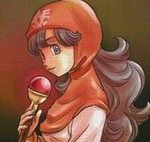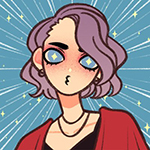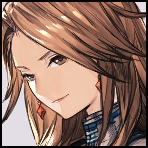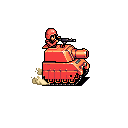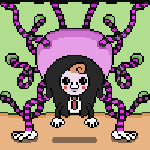WORLDBUILDING TO FIT CHARACTERS, OR CHARACTERS TO FIT THE REST OF THE WORLD?
Posts
Pages:
1
In this thread, LockeZ said:
So I thought I'd make a thread based on this, because it sounds interesting! What's your method of worldbuilding? Do you build the world and then put in characters that fit? Do you build characters and make a world to match? Or is it all part of the same process, and characters and the world they live in are designed at the same time?
Personally, my usual process is "Vague Outline of the sort of game I want to make and the sort of story I want to tell," then I make Characters, then I make the rest of the world around what's needed.
For example, I'll start with a vague idea like "A Christmas arcade-style kind of game with cute characters and present-collecting" or "A yuri game that plays with old-school defeat-the-overlord storylines" and then I'll go about designing all the characters, and after that I'll fill everything else in.
I'm very character-focused, though, so I'm sure that there are a ton of different ways to go about world-building. I'm interested to hear yours and how you work on your games and stories :DDDDD
author=LockeZ
I thought this was going to be about story themes, and conflicts, and building compelling worlds that add value to your characters, and building compelling characters that add value to your worlds. About deciding whether you should come up with the ambiance and history and theology and government and appearance of the world first, and then design the personality and upbringing and goals and beliefs and flaws of your main characters to fit with them, or do it the other way around, or something in between.
but no it was about people fitting in doors
So I thought I'd make a thread based on this, because it sounds interesting! What's your method of worldbuilding? Do you build the world and then put in characters that fit? Do you build characters and make a world to match? Or is it all part of the same process, and characters and the world they live in are designed at the same time?
Personally, my usual process is "Vague Outline of the sort of game I want to make and the sort of story I want to tell," then I make Characters, then I make the rest of the world around what's needed.
For example, I'll start with a vague idea like "A Christmas arcade-style kind of game with cute characters and present-collecting" or "A yuri game that plays with old-school defeat-the-overlord storylines" and then I'll go about designing all the characters, and after that I'll fill everything else in.
I'm very character-focused, though, so I'm sure that there are a ton of different ways to go about world-building. I'm interested to hear yours and how you work on your games and stories :DDDDD
I think I'm pretty much the same - I definitely focus on building characters first, and afterwards developing a place and a story where they can get into trouble.
My games usually start from a purely mechanical idea like, "Wouldn't it be fun if there was a platformer where the gravity flipped?" After that, I usually make enough of that mechanic to see if it's enjoyable, and meanwhile I'm thinking about what kind of theme and mood I want in my game. Frustration? Power? Love? Panic? I try and match the theme to the gameplay to a loose extent - for example, Résumé was a challenging / frustrating game, and I tried to tell a similar-feeling story. This can be really tricky to do though, because traditionally games are about skill and cleverness, which doesn't necessarily mesh well with themes like love... but it's not impossible!
After that, I usually write characters and a plot to drive them into interesting situations, ones that drive home the theme I'm working with. If your characters are developed in your head, usually it's pretty easy to think of what they're going to do! Then you just put them into situations where they will inevitably deal with the theme that you're trying to write about - they fall in love, or they scream and rage at one another, or they betray each other. The plot is usually just a mechanism for my characters. Even a world-spanning plot about politics and war becomes more interesting when the politics are driven by a charismatic or interesting character that the player wants to know more about. I think we as humans can connect more readily to individual characters than we can with vaguer things like ideals.
Anywho, I'm still trying to learn all sorts of techniques, both for writing characters and plots.
My games usually start from a purely mechanical idea like, "Wouldn't it be fun if there was a platformer where the gravity flipped?" After that, I usually make enough of that mechanic to see if it's enjoyable, and meanwhile I'm thinking about what kind of theme and mood I want in my game. Frustration? Power? Love? Panic? I try and match the theme to the gameplay to a loose extent - for example, Résumé was a challenging / frustrating game, and I tried to tell a similar-feeling story. This can be really tricky to do though, because traditionally games are about skill and cleverness, which doesn't necessarily mesh well with themes like love... but it's not impossible!
After that, I usually write characters and a plot to drive them into interesting situations, ones that drive home the theme I'm working with. If your characters are developed in your head, usually it's pretty easy to think of what they're going to do! Then you just put them into situations where they will inevitably deal with the theme that you're trying to write about - they fall in love, or they scream and rage at one another, or they betray each other. The plot is usually just a mechanism for my characters. Even a world-spanning plot about politics and war becomes more interesting when the politics are driven by a charismatic or interesting character that the player wants to know more about. I think we as humans can connect more readily to individual characters than we can with vaguer things like ideals.
Anywho, I'm still trying to learn all sorts of techniques, both for writing characters and plots.
I usually focus on character design and worldbuilding first and foremost, because boy, I fucking love me some good old fashioned worldbuilding. Usually I think of some main characters and villains or just general character design ideas, and think to myself "where do these people come from, what's their world like?" and start building it from there.
I only start writing a story once I have a fairly decent idea of the world it will take place in- then I can do deeper worldbuilding and writing at the same time, and really flesh things out, and start reiterating on my character designs and really bringing them more and more to life as it goes on. So basically, it starts off with a few seeds, and then I'm managing a whole garden of locations and characters and getting really into the flow of it.
and then i might think about gameplay
maybe
if the game is lucky
I only start writing a story once I have a fairly decent idea of the world it will take place in- then I can do deeper worldbuilding and writing at the same time, and really flesh things out, and start reiterating on my character designs and really bringing them more and more to life as it goes on. So basically, it starts off with a few seeds, and then I'm managing a whole garden of locations and characters and getting really into the flow of it.
and then i might think about gameplay
maybe
if the game is lucky
I think it all kind of comes in a jumbled chaos for me. A character concept here, a setting idea there, plot point here--and then I go about making sense of it and fleshing everything out. I usually work on it all at once, no particular order, just whatever interests me at the moment. But it's all likely to change as the plot develops. Lots of revisions all the time.
One thing I will say is that I don't like having a character all figured out beforehand. I want them to remain a bit conceptual and develop form as I hammer out the world and plotline. By the time I've got a concrete plot, I expect to have some dynamic characters.
One thing I will say is that I don't like having a character all figured out beforehand. I want them to remain a bit conceptual and develop form as I hammer out the world and plotline. By the time I've got a concrete plot, I expect to have some dynamic characters.
Red_Nova
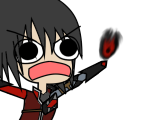
Sir Redd of Novus: He who made Prayer of the Faithless that one time, and that was pretty dang rad! :D
9192
Yeah, I'm more character-focused than world focused, so I design the world to suit the needs and abilities of the character(s).
I start off by designing the main character. For me, this is the #1 most important aspect of any story driven RPG. After all, it is the shoes of this character that players will be stepping into. If those shoes don't fit, or if they're annoying to wear, then there will be a schism between the player and the world that the player needs to be immersed in because the player will be frustrated will wish to switch to a new pair. So you need to make sure to get this right. Who is he/she? What's this character's personality? What is this character trying to accomplish?
Seriously, I go in depth with this. Even to the point where I come up with a bunch of backstory that doesn't even get used! At least not directly. I'll get to this later, though.
After you have your main character defined, come up with gameplay abilities that reflect this. If you try to match the gameplay style with the main characters style, abilities should come to you pretty easily. For example, a kindhearted person would not have many ailment-inflicting skills, while a character that's more akin to a merry prankster would probably have many debuffing skills. Not only does this give your game a more personal feel, but it also trims the fat of the typical RPG. Some people that I know add in some abilities that inflict states like Poison or Blind just because it's a common thing in RPGs. So? Adding elements just to add them only makes your game feel more generic.
At this point, I have the main character's battle defined. Now it's time to go up to the next level: World.
A character is more than how it acts in battle. If a character can do other things outside of combat, it really helps make the player feel like they're part of the world, and not just moving from one combat arena to the next. For example: How would such a character tackle a simple obstacle of trying to navigate across a river? Well, the answer would vary depending on the personality. A brave character may simply choose to wade across the river and press on, ignoring the potential hypothermia. A playful trickster would take a more graceful approach, like jumping across stones. A sadistic person or pyromaniac may elect to destroy a tree to create a bridge to cross. A cautious/patient person would refuse to cross the river via any of the previous methods, and instead elects to backtrack and search for a bridge to safely cross.
Recall the character's personality. What kind of solution would your character pick to overcome this obstacle? This is the sort of process I go through whenever I design characters.
Now, if I'm designing a game with other party members, I probably won't need to go as much in depth about how they navigate the world. It would be nice, but not required. I DO, however, need to go through the process to defining their personalities and coming up with gameplay elements that fit them.
EDIT:
Remember when I said that I made a lot of info and backstory that doesn't directly get used? Well, you can indirectly tell those stories in different ways. You can give some characters a passive skill that fits their personality. For example, a vengeful person or a person with an exceptionally strong will to live can activate a skill that boosts their parameters when their health falls below a certain point.
Sometimes, simply the art design of the character is enough. Maybe a character is a child at heart, and has a more colorful wardrobe? A traveling type probably forgoes fancy garments in favor of more practical, earthy clothes roughed up by the elements? Stuff like that.
I start off by designing the main character. For me, this is the #1 most important aspect of any story driven RPG. After all, it is the shoes of this character that players will be stepping into. If those shoes don't fit, or if they're annoying to wear, then there will be a schism between the player and the world that the player needs to be immersed in because the player will be frustrated will wish to switch to a new pair. So you need to make sure to get this right. Who is he/she? What's this character's personality? What is this character trying to accomplish?
Seriously, I go in depth with this. Even to the point where I come up with a bunch of backstory that doesn't even get used! At least not directly. I'll get to this later, though.
After you have your main character defined, come up with gameplay abilities that reflect this. If you try to match the gameplay style with the main characters style, abilities should come to you pretty easily. For example, a kindhearted person would not have many ailment-inflicting skills, while a character that's more akin to a merry prankster would probably have many debuffing skills. Not only does this give your game a more personal feel, but it also trims the fat of the typical RPG. Some people that I know add in some abilities that inflict states like Poison or Blind just because it's a common thing in RPGs. So? Adding elements just to add them only makes your game feel more generic.
At this point, I have the main character's battle defined. Now it's time to go up to the next level: World.
A character is more than how it acts in battle. If a character can do other things outside of combat, it really helps make the player feel like they're part of the world, and not just moving from one combat arena to the next. For example: How would such a character tackle a simple obstacle of trying to navigate across a river? Well, the answer would vary depending on the personality. A brave character may simply choose to wade across the river and press on, ignoring the potential hypothermia. A playful trickster would take a more graceful approach, like jumping across stones. A sadistic person or pyromaniac may elect to destroy a tree to create a bridge to cross. A cautious/patient person would refuse to cross the river via any of the previous methods, and instead elects to backtrack and search for a bridge to safely cross.
Recall the character's personality. What kind of solution would your character pick to overcome this obstacle? This is the sort of process I go through whenever I design characters.
Now, if I'm designing a game with other party members, I probably won't need to go as much in depth about how they navigate the world. It would be nice, but not required. I DO, however, need to go through the process to defining their personalities and coming up with gameplay elements that fit them.
EDIT:
Remember when I said that I made a lot of info and backstory that doesn't directly get used? Well, you can indirectly tell those stories in different ways. You can give some characters a passive skill that fits their personality. For example, a vengeful person or a person with an exceptionally strong will to live can activate a skill that boosts their parameters when their health falls below a certain point.
Sometimes, simply the art design of the character is enough. Maybe a character is a child at heart, and has a more colorful wardrobe? A traveling type probably forgoes fancy garments in favor of more practical, earthy clothes roughed up by the elements? Stuff like that.
I create my characters first, then gradually build up a storyline while fleshing out the world that they inhabit. I also pick a specific theme for my game world ( Enelysion is Celtic-inspired, while Tristian is loosely based off Arthurian myth. Because the two are closely tied together, I can link things from both games with regards to lore and such ). Then it becomes lots of fun to link the mythos from two different games together. ^^
I tend to start out small, but as my game grows in scope and size, do I start fleshing out the backstories of playable characters, their history/ancestors and general mythos and legends. The player in the beginning won't care about this, so the trick is to do it gradually. Once they're immersed in the game world you've created, can you add those little snippets of trivia and such. I rarely, if ever, write out a 10,000 word essay of what my game will consist of in regards to characters, locations, plots etc.
For me, the plot is just there for my characters to run around in the world I made for them, but it doesn't mean I'd slack off in that department either. Unless you're going real old-school, of course. XD
I tend to start out small, but as my game grows in scope and size, do I start fleshing out the backstories of playable characters, their history/ancestors and general mythos and legends. The player in the beginning won't care about this, so the trick is to do it gradually. Once they're immersed in the game world you've created, can you add those little snippets of trivia and such. I rarely, if ever, write out a 10,000 word essay of what my game will consist of in regards to characters, locations, plots etc.
For me, the plot is just there for my characters to run around in the world I made for them, but it doesn't mean I'd slack off in that department either. Unless you're going real old-school, of course. XD
author=GoatBoy
One thing I will say is that I don't like having a character all figured out beforehand. I want them to remain a bit conceptual and develop form as I hammer out the world and plotline. By the time I've got a concrete plot, I expect to have some dynamic characters.
One thing I've found is that your own characters can surprise you. I keep things a little fluid in regards to them, because sometimes, after I've planned all the events in the game, my brain goes "This character would totally handle this differently. And I can work it into the game in a way that improves it!" Even though I like to have a good outline of what I'm doing, I still have moments like these somewhat often.
author=Red_Nova
Seriously, I go in depth with this. Even to the point where I come up with a bunch of backstory that doesn't even get used! At least not directly. I'll get to this later, though.
I like this! I think that by asking and answering your own "backstory" questions about your characters - Where did they grow up? What kind of people and culture were they surrounded by? What inspires them? - you help develop your character and you learn how they'll react to any specific situation. You don't always have to reveal this backstory to the player, but you can imply it through the character's actions. Sometimes it's more interesting to let the player make their own assumptions.
I'm not sure whether I start with characters or setting. Sometimes I create lot of lore, some basic story premise and then I start writing characters. Usually, I don't define them too strictly as their dialogue lines give them their personality. It doesn't work all the time and often I do it differently.
But I don't have so many gam mak exps to react objectively.
But I don't have so many gam mak exps to react objectively.
I typically start with defining the characters in the game. Even with Okiku, Star Apprentice, the character of Okiku came first. The game's core gameplay mechanic, along with evolutions, and whatever else, came later on.
Though, there was Myriad Cypher. Now, with that game, the game-world, and the base pick-up-and-deliver mechanic came first. Story and characters came a bit later!
Though, there was Myriad Cypher. Now, with that game, the game-world, and the base pick-up-and-deliver mechanic came first. Story and characters came a bit later!
It really varies for me; goatboy's discussion of assembling chaos fits pretty well, though I do figure out characters completely in the planning stages. Actually, I tend to construct plots around them so that I know where they're at and where they're going and what it takes for them to get there (and "there" is a state of being, not a location). That said, sometimes unplanned moments will come up, and I'm flexible enough to let the character take over. Examples of the variety of where my game ideas have come from (a few spoilers for people who haven't played these):
-A Very Long Rope started with the image of a rope coming down from the clouds and ending next to an old man's house, which was carved into the side of a cliff where he lived alone. I had a dream of that image and wanted to incorporate that into a story. The game sort of evolved from that initial image into a game about isolation, the old man turned into a couple of young girls after I thought about what I wanted to accomplish, and eventually it turned into what it was. I just wish I would have had more design experience when I started so that I would have thought of the design components more critically.
-God of Crawling Eyes started with the black and white aesthetic since I knew it was something I could accomplish in the three weeks of development time (and it was something that screamed :old, black and white horror movies" to me). From there I justified the aesthetic by making the main character color blind and then realized I was making a game where perception was at the center, so I built the gameplay and story around that idea.
-Heart Pumps Clay started with me wondering how I could make a leveling down mechanic make sense. The protagonists popped up really quickly after I tied the mechanic with the idea of self-sacrifice. The antagonists made sense when I realized what a weird riff on the standard rpg party that I'd made; since I essentially was making antiheroes, I thought it natural to pit them against a standard rpg party of knight/mage (and priest depending on when you fight him)/thief turned on its head.
-Born Under the Rain started with a desert since Indrah really wanted to use a few Egyptian tilesets she'd been accumulating. Several years ago, I wrote a story about a father who lost his son, and the distance between him and his wife/daughter was symbolized by a sphinx that moved into their house and started living with them (I was really into magical realism at the time--still kind of am, actually--got a great full-length rpg idea using it). I kind of wanted to do a riff on that idea (obviously there would have been major changes so that it would be an actual game), but Indrah doesn't like serious games, so I thought more about what I like from Egyptian media and came up with "mystery" and "exploration," and my pitch to LockeZ and Indrah was centered around hunting for relics. When I made the characters to fit that, I used a tiny thread from my initial idea, and I tried to make everything mostly comical in order to fit Indrah's sensibilities but still kept a serious core.
-Jimmy and the Pulsating Mass literally started with the title. I thought it was an awesome title because of the conflict between its "kid story" cadence and its Lovecraftian implications, and so I focused on who Jimmy would be in this story and constructed a game around him.
So, I guess in the case of my games, all of them had different geneses. I think with all of them, though, no matter what the initial seed was, I tried to prioritize the characters.
-A Very Long Rope started with the image of a rope coming down from the clouds and ending next to an old man's house, which was carved into the side of a cliff where he lived alone. I had a dream of that image and wanted to incorporate that into a story. The game sort of evolved from that initial image into a game about isolation, the old man turned into a couple of young girls after I thought about what I wanted to accomplish, and eventually it turned into what it was. I just wish I would have had more design experience when I started so that I would have thought of the design components more critically.
-God of Crawling Eyes started with the black and white aesthetic since I knew it was something I could accomplish in the three weeks of development time (and it was something that screamed :old, black and white horror movies" to me). From there I justified the aesthetic by making the main character color blind and then realized I was making a game where perception was at the center, so I built the gameplay and story around that idea.
-Heart Pumps Clay started with me wondering how I could make a leveling down mechanic make sense. The protagonists popped up really quickly after I tied the mechanic with the idea of self-sacrifice. The antagonists made sense when I realized what a weird riff on the standard rpg party that I'd made; since I essentially was making antiheroes, I thought it natural to pit them against a standard rpg party of knight/mage (and priest depending on when you fight him)/thief turned on its head.
-Born Under the Rain started with a desert since Indrah really wanted to use a few Egyptian tilesets she'd been accumulating. Several years ago, I wrote a story about a father who lost his son, and the distance between him and his wife/daughter was symbolized by a sphinx that moved into their house and started living with them (I was really into magical realism at the time--still kind of am, actually--got a great full-length rpg idea using it). I kind of wanted to do a riff on that idea (obviously there would have been major changes so that it would be an actual game), but Indrah doesn't like serious games, so I thought more about what I like from Egyptian media and came up with "mystery" and "exploration," and my pitch to LockeZ and Indrah was centered around hunting for relics. When I made the characters to fit that, I used a tiny thread from my initial idea, and I tried to make everything mostly comical in order to fit Indrah's sensibilities but still kept a serious core.
-Jimmy and the Pulsating Mass literally started with the title. I thought it was an awesome title because of the conflict between its "kid story" cadence and its Lovecraftian implications, and so I focused on who Jimmy would be in this story and constructed a game around him.
So, I guess in the case of my games, all of them had different geneses. I think with all of them, though, no matter what the initial seed was, I tried to prioritize the characters.
LockeZ

I'd really like to get rid of LockeZ. His play style is way too unpredictable. He's always like this too. If he ran a country, he'd just kill and imprison people at random until crime stopped.
5958
Typically I go with a world-first approach. Or, more accurately, the first thing I come up with is a neat situation. This is sort of like a setting, but also more than that. It's something like:
- The armies of heaven and hell having an eternal war waged by playing killer rock music
- A third world dictatorship gaining control of paranormal artifacts that have supernatural powers
- A fan sequel to Chrono Trigger, where the player's goal is to prevent Chrono Cross from ever existing
- Zombies regain self-awareness halfway into a zombie apocalypse and realize they've been eating people
So I guess it's a setting plus a main event? Which in most cases ends up being a setting plus a conflict. There's not much substance at this point beyond "Damn, that is a really neat idea." I have some very general idea of the setting, but only in terms of the region or nation it'll take place in, not in terms of the buildings and rooms it'll take place in.
Once I have that, I start coming up with characters that will have unique and varying perspectives on the situation. For example, the third world dictatorship with demonic artifacts ended up having characters including a 90s action hero with a grudge, a paranormal detective who learns too much, a ghost who was wrongly executed by the government but has regained sapience only because of the blessing of the artifacts, the dictator himself, his loyal bodyguard who cares more about his safety than his ambitions, an innocent child that obtains incredible destructive powers and goes mad, a demon that gets summoned against its will, etc. Each of these characters has a wildly different perspective on the key elements of the main situation that the story revolves around. Together I feel like they fully explore the situation to its fullest, which is my goal. All the implications of the government obtaining and misusing the demonic artifacts are considered and touched on through one of the characters.
Once I have the characters in mind, I start figuring out the more specific aspects of the setting: what buildings and locations they visit, and in what order. These mostly get decided based on my attempts to justify the characters meeting each-other, working together, and fighting against one another. A few places end up just being cool ideas that I think fit well thematically, or locations that I think help deliver a perspective of their own on the theme (like a paranormal research facility).
This method of creating characters can result in characters that you wouldn't normally expect to get along or work together, since each one has a wildly different viewpoint on the story's main conflict. However, that suits my game design method just fine, since I like to make JRPGs where the party members come and go all the time, and the perspective shifts between different characters rather frequently.
I think part of the reason I write stories this way is because this is the order in which I get sold on stories. If I pick up a TV show or a movie or a game, it's not because the main character has a good personality - it's because the premise sounds cool. That's the first thing I care about as a consumer, and if the premise doesn't catch my eye, I'll never get any further.
- The armies of heaven and hell having an eternal war waged by playing killer rock music
- A third world dictatorship gaining control of paranormal artifacts that have supernatural powers
- A fan sequel to Chrono Trigger, where the player's goal is to prevent Chrono Cross from ever existing
- Zombies regain self-awareness halfway into a zombie apocalypse and realize they've been eating people
So I guess it's a setting plus a main event? Which in most cases ends up being a setting plus a conflict. There's not much substance at this point beyond "Damn, that is a really neat idea." I have some very general idea of the setting, but only in terms of the region or nation it'll take place in, not in terms of the buildings and rooms it'll take place in.
Once I have that, I start coming up with characters that will have unique and varying perspectives on the situation. For example, the third world dictatorship with demonic artifacts ended up having characters including a 90s action hero with a grudge, a paranormal detective who learns too much, a ghost who was wrongly executed by the government but has regained sapience only because of the blessing of the artifacts, the dictator himself, his loyal bodyguard who cares more about his safety than his ambitions, an innocent child that obtains incredible destructive powers and goes mad, a demon that gets summoned against its will, etc. Each of these characters has a wildly different perspective on the key elements of the main situation that the story revolves around. Together I feel like they fully explore the situation to its fullest, which is my goal. All the implications of the government obtaining and misusing the demonic artifacts are considered and touched on through one of the characters.
Once I have the characters in mind, I start figuring out the more specific aspects of the setting: what buildings and locations they visit, and in what order. These mostly get decided based on my attempts to justify the characters meeting each-other, working together, and fighting against one another. A few places end up just being cool ideas that I think fit well thematically, or locations that I think help deliver a perspective of their own on the theme (like a paranormal research facility).
This method of creating characters can result in characters that you wouldn't normally expect to get along or work together, since each one has a wildly different viewpoint on the story's main conflict. However, that suits my game design method just fine, since I like to make JRPGs where the party members come and go all the time, and the perspective shifts between different characters rather frequently.
I think part of the reason I write stories this way is because this is the order in which I get sold on stories. If I pick up a TV show or a movie or a game, it's not because the main character has a good personality - it's because the premise sounds cool. That's the first thing I care about as a consumer, and if the premise doesn't catch my eye, I'll never get any further.
I don't really follow either consistency. Whether you want the world to fit your character and whether you want your character to fit the world depends on what area you want to focus on in your story. I think the latter happens inevitably, though. Say you construct the world to fit a particular character's image/likeness (like a drug trip or something)... Then wouldn't you have already created a character that fits the world?
i make characters i like and come up with an excuse to throw them into a dungeon. characters are my #1 priority. not saying that's universally the best way to go about it, but for me personally i don't do grand, sweeping epics... i make games about crazy skeleton lords and angry ice goddesses that a group of sarcastic twits have to deal with.
Neither one. I design characters and their personality independently of the world they live in. I come up with the characters, then figure out the setting, and it doesn't have to fit. As in, I don't really care much that the character is a wizard in a high tech world.
I design the world first, and then think of characters to fit in that setting. That being said, I'll often have character types that I want to have present before I start making the world so that will influence the worldbuilding.
Also I need to think of world explanations for why the characters can do what they do, cause if those aren't there I think I'd self destruct.
(i swear i make things, they just aren't screenshot-able yet.)
Also I need to think of world explanations for why the characters can do what they do, cause if those aren't there I think I'd self destruct.
(i swear i make things, they just aren't screenshot-able yet.)
LockeZ

I'd really like to get rid of LockeZ. His play style is way too unpredictable. He's always like this too. If he ran a country, he'd just kill and imprison people at random until crime stopped.
5958
author=unityauthor=GoatBoyOne thing I've found is that your own characters can surprise you. I keep things a little fluid in regards to them, because sometimes, after I've planned all the events in the game, my brain goes "This character would totally handle this differently. And I can work it into the game in a way that improves it!" Even though I like to have a good outline of what I'm doing, I still have moments like these somewhat often.
One thing I will say is that I don't like having a character all figured out beforehand. I want them to remain a bit conceptual and develop form as I hammer out the world and plotline. By the time I've got a concrete plot, I expect to have some dynamic characters.
This has caused me some problems when the result ended up being more like "This character would totally handle this differently. But that would create a giant plot hole and ruin the player's reason for visiting these two entire dungeons and towns!"
Pages:
1













